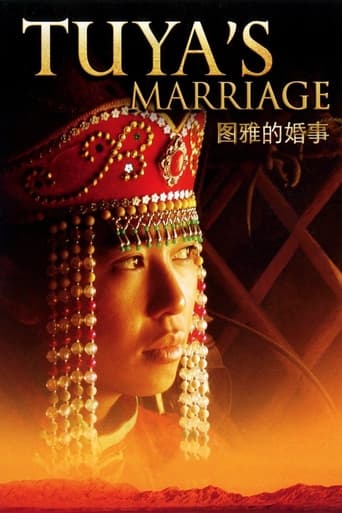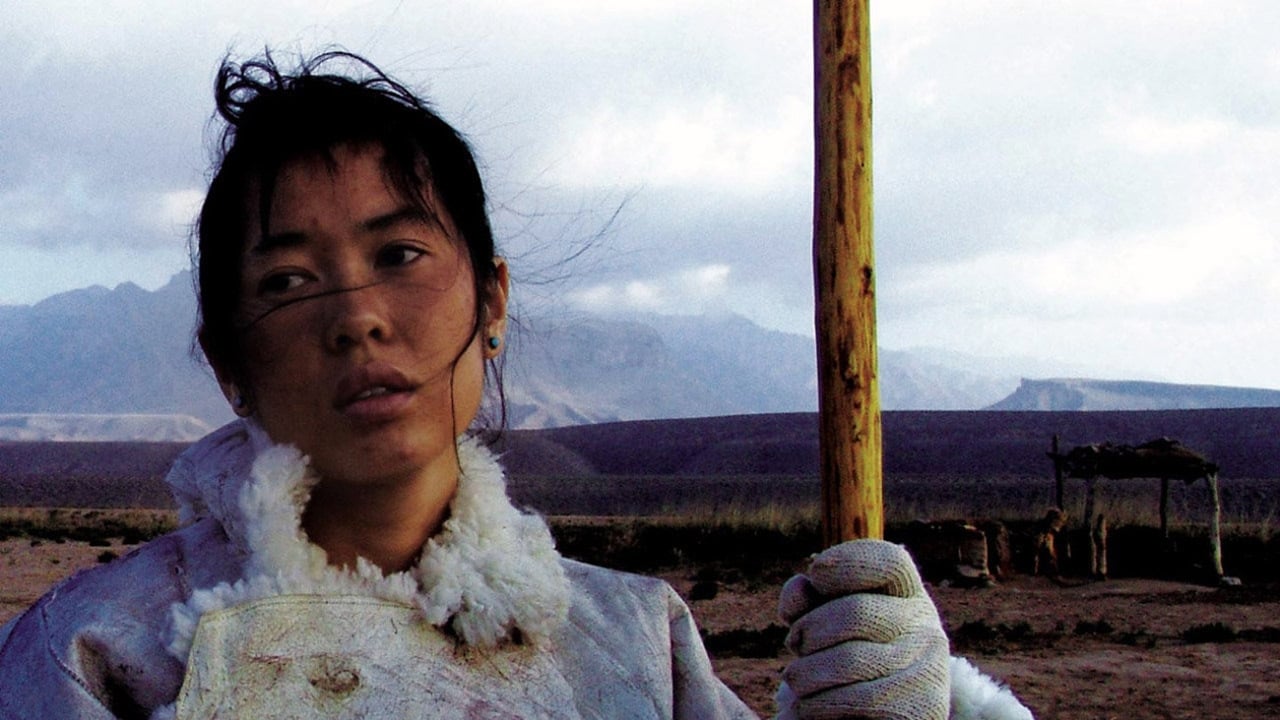rhkoehler
Last week I watched Tuya's Marriage and I was pretty interested in the the movie. I thought it would be a nice change from my normal genre taste and a nice way to see the culture of the Mongolians. After watching it though, I have to say it was such a boring movie that I wanted to fall asleep half way through it. I thought it was very boring and the story line was just very plain and not interesting. The names all sounded the same to me and I just felt that the everyday life of these people was just a giant melting pot of stuff. The thing that makes me the most upset is the ending. Tuya still meets with the suitors and makes a deal even though she knows that Shenge wants to marry her, but at the end of the movie you see Shenge and Tuya's ex husband fighting about the marriage and we never got to know who she was even marrying. This left me in a state of confusion and it just made me dislike the movie more and more. I would not recommend this movie but I guess it is a nice way of seeing life in Mongolia.
Damadjunglist
Just a beautiful and authentic movie with beautiful scenery of Mongolia, China and gives a good idea of daily life of a different kind in this world. I especially liked the tranquil way it has been shot almost like a documentary style way of filming. Also the actress who plays Tuya in this movie has such a beautiful face that it's even noticeable tightly wrapped in her traditional headscarf. I can't say absolutely nothing negative about this movie. There should be much more movies like this coming out that not only have the ability to entertain you but even make people think about what we think life is really about.
Armand
almost documentary. a woman in Inner Mongolia. her family. and her husband. a delicate situation. and one option. nothing else. result - a film about basic things in a isolated space. taste of sand and dust. a silent heroic existence. beauty of images. drops of humor. and sensation of a lot of pictures by strangers. very familiar pictures. a warm feeling, mixture of compassion and curiosity. a border film between testimony and art product. because the story is present in many movies from East. because the place, language or details are only pieces of a large arena.after its end, the flavor of savage beauty remains in memory. more than social postcard, it is trip in forms of human meetings as form of profound happiness.
slt20
An unexpected gem in the middle of the desert, this quiet drama proves itself fully deserving of its Golden Bear at the 2007 Berlin annual film festival.Sixth generation, Mainland Chinese film director Wang Quanan once again bands with actor, and ex-partner of ten years, Nan Yu, to turn his attention to the rural side of life in China- a focal point of his 2004 film The Story of Ermei, which told the story of a young Shaanxi peasant girl. This time 'Tuya's Marriage' takes us into the depths of the vast and arid grasslands of Inner Mongolia. Though its plot is fairly straight forward, and dialogue simple, this quiet and understated film stands strong in its realistic portrayal of rural life, natural acting style, and breath taking landscape. Her husband crippled after digging a well, strong and persevering Tuya must labour, herding sheep and lugging water from a faraway waterhole, to keep her husband and two young children alive. But the young, and still beautiful Tuya can no longer be the sole carrier of her family's burden- she is suffering from lumbar fatigue caused by over exhaustion, and faces possible lower body paralysis. Her husband agrees that she must find a new suitor to marry. This doesn't prove to be so easy though, as Tuya, still faithful to her old husband, is resolute that whoever wishes to marry her must also be prepared to care for him too. Mainland Chinese born actor Nan Yu is well fitted in her role as the independent Tuya. The fact that Nan Yu spent several months living in rural Mongolia prior to filming has given her a great understanding and confidence in the role and comes off as a genuine Inner Mongolian grasslands shepherdess. Tuya's costume potentially could have swallowed many actors whole- she is swathed in numerous, bulky layers of clothing and wrapped tightly in a head scarf- but Nan Yu's expressive face works to bring Tuya to life. Tuya is an independent, incredibly strong woman. She is a shepard to the men around her- her disabled husband Baotoer, her likable but foolish friend Shenge who always falls on bad luck, and even her younger son. She has an incredibly strong loyalty towards her husband "The only way I'd leave him is if I became worse than him" and for his sake turns down many suitors who could have been a way out of poverty for her. But there are a few times when we get to see another side of Tuya's tough exterior. My favourite scene is when we see her, taken away from the farm and work, sitting together with her friend Shenge in his brand new truck. Orange light shines on them from the setting sun, and as they look forward into the distance Shenge speaks of the uncertainties of the future. For a moment we see a fragile young woman, no different from ourselves, who is lost in a big, and changing world.If Nan Yu is the star of the movie, then the landscape would have to be her co-star. Absolutely stunning with it's never ending, barren desert and clear blue skies, the long shots show the vastness of the land and isolation of the characters. The women in the film wear brightly coloured head scarves- pink, red, purple, green- as a way of expressing them selves, and these headscarves are a striking contrast against the often dust coloured backdrop.The use of music in this film is also truly effective. Traditional string instruments are often used, along with woman singing. The music is only used at the saddest times in the film, and is combined with long, enduring shots of the wild and desolate landscape. This creates a haunting feeling of loneliness and forlornness. Both landscape and music become symbolic of Tuya's situation- she is stranded with no solution in sight. Tuya's Marriage generally fits into the drama genre. The film deals with realistic and totally believable characters, and explores how social issues such as poverty and alcoholism bring these characters into conflict with themselves, and the others around them. Poverty makes rural farm life in China tough, and relatively simple tasks such as watering the sheep become difficult because lack of adequate equipment- Tuya must travel 30miles a day just to fetch sufficient water. The question of day to day survival forces characters to make decisions that go against every part of their being-it becomes a cruelly ironic when the only way for Tuya to care for her disabled husband, Baotoer, who she loves, is to divorce him. Several of the characters look to alcohol to numb the pain. An older chain-smoking woman, worn out by life's trials, says "I'm raising six by myself with no man; if I didn't drink I don't know what I'd do." In a sense Tuya's Marriage also becomes a documentary of Mongolian culture and traditional ceremonies, often putting a lot of focus on the landscape, the traditional ceremonies and dress, the music, and traditional foods such as head-to-tail lamb and milk tea. This makes the film a fascinating experience, but my only possible complaint is that this overtakes the films over focus on showing intimate interactions between the characters. Beautiful and affecting, and often scattered with moments of humour and tenderness, Tuya's Wedding gives us a window into a seldom travelled world through the struggles of one young woman.


 AD
AD
